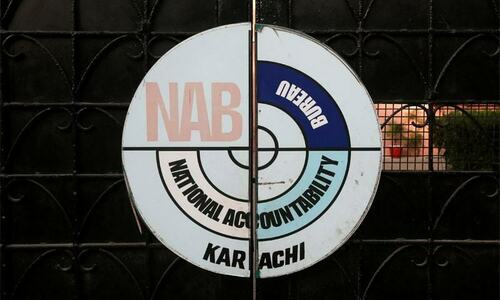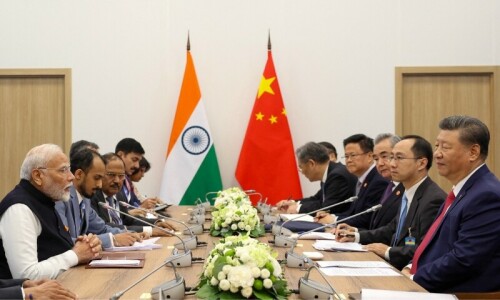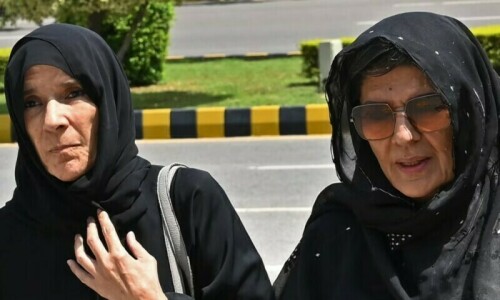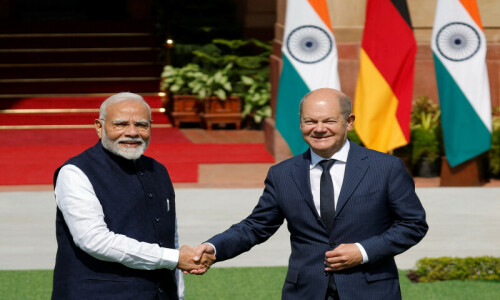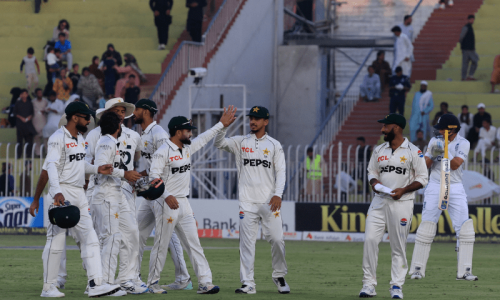The organisers of the Asma Jahangir Conference condemned the alleged "muzzling" of PML-N supremo Nawaz Sharif's speech on Sunday, after internet services at the venue were reportedly suspended soon after his address began.
Nawaz began his speech — relayed from London via video link during the closing ceremony of the keenly watched conference held in Lahore — by paying tribute to the late celebrated lawyer and human rights activist Asma Jahangir, but the live stream abruptly stopped shortly after.
Munizae Jahangir, Asma's daughter and one of the organisers, confirmed to Dawn.com that broadband internet services and mobile internet had been suspended soon after Nawaz began speaking.
In a statement issued after the event, the organisers regretted what they termed "the state’s highhandedness" for allegedly blocking Nawaz's speech.
"The internet provider was restrained from providing the organisers with internet services for the conference two hours before the closing and Mr Sharif’s speech was supposed to start," the statement said, adding that cellular internet services were also cut off two hours before the closing session in the vicinity of the Avari Hotel Lahore.
"The organisers of Asma Jahangir Conference 2021, which include the Supreme Court Bar Association, Pakistan Bar Council, and the AGHS, strongly condemn this act and consider it an onslaught on the freedom of expression."
When reached for comment on the allegations, federal Information Minister Fawad Chaudhry said he was not aware of any such move by the authorities. Meanwhile, Punjab government spokesperson Hassan Khawar did not respond to the request for comment.
After the video call was cut off, the organisers arranged for a telephonic address by Nawaz, according to their statement.
It quoted Munizae as saying: “We believe in freedom of expression that is why this non-partisan platform is open to everyone and we condemn the muzzling of the closing session where Mian Nawaz Sharif was going to make an address.”
Nawaz calls for a 'national strategy'
In his wide-ranging speech, Nawaz called for immediately devising a national agenda to pull Pakistan out of its current crises and take it on the path of democracy, reiterating the need to "put our house in order".
The former prime minister once again hit out at the military establishment and criticised interference in judicial and government affairs that he claimed had led to Pakistan's "downfall".
He said the current era that Pakistan was going through was a "turning point" in its history.
"The most dangerous aspect is the deepening disappointment and severe helplessness [among the people]," he said. "History is witness that when nations descend into the quagmire of despair, questions start to be raised about that nation's survival."
He said the 220 million people of Pakistan were demanding answers to some fundamental questions and until they received those, the country's state of affairs would not improve.
"If the tongue of the questioner is pulled, this does not resolve problems," he added, likening the allegedly deliberate internet disruption during his speech to "pulling [our] tongue".
"Will this solve problems? And then picking up those asking questions and disappearing them, will that end the questions? Unfortunately, the current era has proven to be the blackest era for freedom of speech and human rights."
He alleged that under the current government, political opponents, journalists, or "any voice speaking the truth" were "disappeared" or jailed for raising critical questions.
The PML-N leader said Pakistan's political history was full of examples that showed that "the Constitution is broken here, laws are broken here, courts are broken here, judgements are obtained through favourite judges, dictators get legitimacy here, a state within a state is run here, political engineering factories are set up here, and [...] vote is stolen here."
The supression, he alleged, was not limited to politicians or media, but even judges "speaking the truth" had to forgo their jobs.
"Headlines are being printed in newspapers about how senior judges issue orders for giving punishments and denying bails," he said.
Nawaz also hit out at the judiciary for "legitimising" martial laws and allowing military dictators to amend the Constitution. He said the Constitution clearly stated that "respectable is the one who obeys the Constitution, and those climbing the walls of Constitution are not respectable but offenders of the Constitution and traitor of the country."
He continued: "I think we need to join hands and agree on one national narrative: adherence to the Constitution and performing duties in its light while staying within our limits; this is the solution to our problems."
The former premier said regional and international circumstances had accentuated Pakistan's need to "correct ourselves".
"That is why I said repeatedly that we have to put our house in order and we should open our eyes. Then the drama of 'Dawn leaks' was staged against us, punishments were given to us through fake cases, and then you saw how [we] were humiliated," he told the audience.
But he said the time had come for the voices present at the event to "gather on one platform and draft a national agenda and give it the shape of a national movement", for the sake of the rule of law and democracy.
"My suggestion is that [based on] all the recommendations given in this conference, an immediate strategy be formed and everyone sit together, so that the path of practical struggle can be adopted. It is very important. We have been very late and cannot afford more delay. This work should be done today," he stressed.
Taking action now, Nawaz said, "can help pull the country out of the chasm it has fallen into and put it on the path of its destination again".
"If this is not done, then lifting it again will become impossible and history will not forgive us."
PTI ministers criticise Nawaz's participation
Hours before Nawaz's virtual address, a number of senior government members criticised the organisers for having invited an "absconder" and "convict" to speak at the conference attended by senior judges and human rights figures.
Information Minister Fawad Chaudhry said he had been invited to the event, but he had been informed that "the conference will be closed with the speech of an absconding convict; this is obviously tantamount to ridiculing the country and the Constitution [which is why] I declined to participate in the conference."
Agreeing with Chaudhry, Human Rights Minister Shireen Mazari said, "When conference organisers call a convict to give concluding address then their political agenda becomes very overt."
In a taunt at the conference's theme — 'Challenges to human dignity', Energy Minister Hammad Azhar tweeted: "Think positive; Perhaps the idea was to focus on [the] human rights of absconders.."
Adviser to the Prime Minister on Interior and Accountability Mirza Shahzad Akbar, meanwhile, said "Having an absconder and convict speak at a conference where [the] CJP and senior judges of superior judiciary and members of Bar have spoken creates serious doubts on [the] impartiality of organisers but also makes it clear that honourable judges should remain clear of such politicised gatherings."
NAB a 'tool to convert people into turncoats': Abbasi
Earlier, former prime minister Shahid Khaqan Abbasi while addressing the conference lashed out at the National Accountability Bureau (NAB) and branded it a "tool to convert people into turncoats".
The PML-N leader gave a speech detailing his grievances against the watchdog and held it responsible for a series of ailments plaguing the country.
During his speech, Abbasi said that in one of the cases filed against him the chargesheet was 35 pages-long, while the NAB reference was 19 pages-long. "You can write anything in any chargesheet [...]. What are we doing, where are we going?"
Lamenting the country's current situation, he continued that the law required him to maintain financial records for the last seven years. However, he was being accused of something that occurred 35 years ago, he said.
"If you accuse me of something, then you also need to give the record for [the last] 35 years. I definitely cannot. I am all for accountability ... [but] NAB is not accountability," he said, accusing the anti-graft watchdog of being a tool to carry out political engineering.

"If you want accountability of politicians, it is very simple. The whole world does it. You don't need special laws, it's about tax laws."
The PML-N leader stated that those who impose taxes on the people of Pakistan should give details of their own assets and answer for their own lifestyles.
"If members of parliament walk out to [sit in] a vehicle that costs Rs30-60 million, go to their Rs500m home [with a] monthly electricity bill of 0.2m. And they pay no taxes, what does that tell you?
"That's a corrupt politician. Why don't we go after them? Let us start with the president of Pakistan. Let the prime minister be next, followed by the leader of the opposition.
"Ask them this basic question: how do you justify your lifestyle?"
'NAB is now solely about victimisation'
The PML-N leader stated that the anti-graft watchdog was now solely about "victimisation", the price of which was being borne by the people of the country.
He said that when NAB was established in 2000, Pakistan had a per capita income of $576, which has since risen to $1,190. "Bangladesh was at $358 and now they are at $2,097 while India has risen to $1,900 from $443."
He continued that accountability and electoral laws could only be amended through consensus. He lamented the fact that when the opposition presented amendments to the laws, they were later disregarded and branded by the government as an attempt to seek an NRO (National Reconciliation Ordinance).
Abbasi also drew attention to the "negative impact" NAB cases can have on an individual.
"Does anybody care about people who are accused by NAB? Does anybody care about their families? Do you know that they can't operate their accounts, businesses or apply for bank loans? There is a big human cost that is paid here."
Selective accountability
He stated that public figures were the only ones subjected to the accountability process every five years and called for having transparent investigations into such allegations.
"Install cameras in court rooms and investigation rooms. Accuse me in front of the people," he said, calling the bureau "a tool to convert people into turncoats and to sell their souls".
Abbasi said that tax laws should be used to disqualify politicians, or use Articles 62 and 63 of the Constitution against them.
"Anybody who is not paying taxes is committing a crime against the country," he said, adding that most citizens think that paying taxes is "optional".
Recounting the process of legislating on the issue of appointing judges, he said that he had moved an amendment which stated that anyone wishing to become a judge should present his tax history for the last 10 years.
"You'd be surprised at how many people who have not paid taxes became judges." He added that those judges who were unable to do so were either not technically qualified to be judges or had hidden their income.
"Are they qualified to judge me tomorrow?" he asked.
Before Abbasi, PPP's Qamar Zaman Kaira also addressed the event.
No pressure on judiciary, says CJP
On Saturday, Chief Justice of Pakistan Gulzar Ahmed addressed the first day of the Asma Jahangir Conference and denied that the judiciary was being influenced by or taking dictation from other institutions.
The chief justice was responding to comments made by former president of the Supreme Court Bar Association, Ali Ahmad Kurd, earlier during the conference. While commenting on the topic of the conference — "Role of Judiciary in Protecting Human Rights and Strengthening Democracy" — Kurd had directed a barrage of criticism towards the judiciary.
In response to Kurd later in the conference, CJP Gulzar said he "absolutely did not agree" with the assessment made by the senior lawyer. He rubbished the allegation that "our courts are not free" and that "we are working under someone's pressure or of the institutions."




